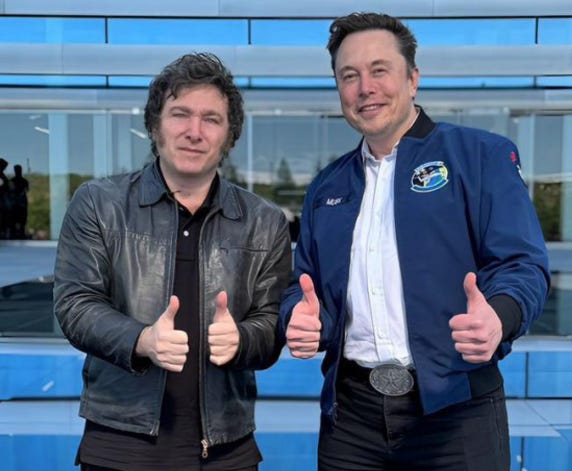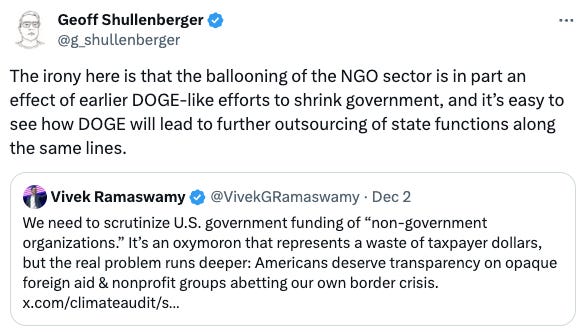Christopher Caldwell’s latest dispatch for Compact concerns the recent elections in Ireland. Bucking the anti-incumbent trend sweeping the world this year, voters there kept the ruling coalition of socially liberal, fiscally neoliberal establishment parties, Fianna Fail and Fine Gael, in power for the moment. It wasn’t the first time Ireland stayed loyal to center-left globalism even as the rest of the world was turning against it. Back in 2019, Bernard-Henri Lévy praised the Irish as “a people who resist the winds of populism.”
Ireland is an unusual country in a number of ways. As Caldwell emphasizes, it is a tax shelter with an economic profile closer to the Cayman Islands (with which it is tied for 3rd place globally in the IMF’s GDP per capita rankings) than to most of its fellow EU member states. It stands out today for being very rich (at least on paper), very globalized, and very woke—an astonishing transformation of an island known for most of its history for being poor, agrarian, and deeply religious. How did this happen? As Caldwell puts it: “The secular revolution and the business revolution—everyone understands that there is some causal link between the two. But which is the cause and which is the effect?”
Angela Nagle, who covered last year’s Dublin riots for Compact, argued a few years ago that the country’s embrace of “the internationalist and multicultural open society values of Google” is a symptom of its “subservien[ce] to the sovereignty and ultimately the values and culture of the corporations who today are its guiding force.” These values are heavily imparted and enforced by NGOs, which in recent decades have taken over the management of Irish society as the Catholic Church has waned in influence. As the old agricultural economy has given away to Fortune 500 headquarters, a new catechism has come to replace the old one. As Caldwell writes: “Where policy is shaped by NGOs, woke becomes desperately important: It is not only the main project of the regime—it is the legitimating principle of the regime.”
On the subject of NGOs, a few days ago I made a moderately popular X post in response to some remarks by co-DOGE-meister Vivek Ramaswamy:
The relevance to Ireland is that the “Irish miracle” is an object of intense reverence from government-shrinking, tax-cutting, private-sector-worshipping libertarians of Ramaswamy’s ilk. If there is a causal relationship between the slashing of the public sector and the ballooning of the NGO sector, that suggests the sort of business-friendly policies Ramaswamy favors may be related to cultural effects he deplores. Put differently, NGOs are part of the “private sector,” and at least in in the United States, conservative hostility to “big government” was one key factor in the expansion of their scope and influence, the consequences of which are now so widely lamented on the right. The Irish situation seems like an even starker example.
Argentine president Javier Milei, who has traded compliments with Ramaswamy and is also in a mutual admiration society with his DOGE colleague Elon Musk, has often stated that his economic model is none other than Ireland, which he calls “one of the best countries in Europe … because they made pro-market reforms.” “Where you give way to freedom,” he said, “society flourishes.” I’m not sure if how much he knows about the NGOs.
This week, The Economist declared that Milei, who by his own account is modeling his approach on Ireland’s, has much to teach Donald Trump and his advisors. That would require a significant reorientation. For one thing, Milei recently slashed tariffs, in line with his free-trade outlook; Trump, as he never tires of reminding us, plans to do exactly the opposite.
The anti-globalist outlook Trump will bring back to the White House bodes poorly for Ireland. The MAGA trade guru Robert Lighthizer’s book No Trade Is Free dedicates a long section to detailing the byzantine corporate-friendly arrangements that have allowed the Emerald Isle to build up a massive trade surplus with the United States, to the detriment of American consumers. “Among the world’s countries,” Caldwell writes, Ireland “is the one that can least stand scrutiny under the principles of economic nationalism as Donald Trump understands it.” Were the populist wave to crest over Ireland, one can only assume it would question the rising-tide-lifts-all-boats logic of globalization that has guided the country’s economic policies for decades. This reckoning may eventually be forced on Ireland by the broader retreat of globalization, as economic nationalism gains strength elsewhere.
It is a peculiar fact, then, that Milei—often portrayed as “Trump of the pampas” and lionized in MAGA-world—aims to emulate the same Irish model that Trumpism calls into question, and that figures in Trump’s orbit like Musk and Ramaswamy, like The Economist, see Milei as a leader for Trump to emulate. To be sure, a great deal of populism is reducible to affect and anti-elite posturing, and the policies populist movements take up are always going to vary widely by context. Nonetheless, it seems at the moment that MAGA is deeply divided between those, like Lighthizer, who are animated mainly by the impetus to dismantle the global economic order that made Ireland the third richest nation on earth through a series of accounting tricks, and those who aspire to give The Economist’s policy wish list a “based” makeover.
Also in Compact this week:
Our new senior editor, Ashley Frawley, on the women who are declaring a Lysistrata-style sex strike in response to Trump’s victory: “4B is just one among many signs of the progressive nihilism of our times—the pervasive ethos of simply stopping.”
Sohrab Ahmari with a scoop on why we should be skeptical of the whistleblower claims against Trump’s defense secretary nominee, Pete Hegseth.
Juan David Rojas reads the tea leaves on US-Mexico relations: “Trump and Sheinbaum may be able to forge a productive relationship—as was the case with her predecessor and mentor, Andrés Manuel López Obrador, popularly known as AMLO.”
David Goodhart on why we shouldn’t take UK Prime Minister Keir Starmer too seriously when he promises an immigration crackdown.
Heather Penatzer on Biden’s lame-duck escalation in Ukraine.
Valerie Stivers on Edwin Frank’s Stranger Than Fiction. “What he has set out to do instead is to create a hybrid form, neither literary criticism nor literary history but the story of the novel’s development in the 20th century, told through representative books.”
Fred Bauer on the history of trade paradigms. “Debates over trade policy cannot simply be reduced to dueling statistical analyses. Rather, trade also needs to be considered as a political question.”






"Libertarian populism" might seem oxymoronic, but it's actually been a powerful force in American politics since at the latest the emergence of the Tea Party. "Keep your government hands off my Medicare!" was used as a caricature to deride the Tea Party, but there was a kernel of truth to it. Ideological coherence is not a requirement for a governing coalition.
"The Economist’s policy wish list a “based” makeover" is a great line!